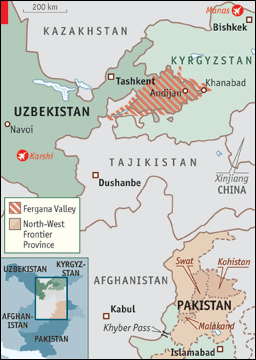The regional dimension to the insurgencies in Afghanistan and Pakistan

CENTRAL ASIA’S militant Islamists have been popping up in some unusual places. Pakistani officials say that Uzbek fighters have numbered among those captured and killed in the government’s offensive to retake the Swat Valley. One Pakistani newspaper claims that local Taliban forces include up to 4,000 foreign fighters, most of them members of the Islamic Movement of Uzbekistan (IMU) who hail from the former Soviet Union. The Pakistani Taliban have not been driving just south toward Islamabad, but also northward to Malakand and Kohistan, leading some experts to fret that militants are aiming to expand their influence towards the China-Pakistan border and even farther afield to the mountains of Tajikistan, one of the IMU’s old stomping grounds.
The Chinese, who have their own Islamists to worry about, are unnerved by the prospect. At the beginning of June President Hu Jintao again demanded, as Chinese leaders have done in the past, that Pakistan root out members of the “East Turkestan Islamic Movement”, a reference to ethnic-Uighur separatists, once closely allied with the IMU, who have found safe haven in the tribal areas.
A few weeks ago American soldiers in Afghanistan found themselves fending off a surprisingly sophisticated ambush by well-equipped guerrillas speaking a mixture of languages on their radios, including, it is believed, Russian. American experts suspected that the attackers included Chechens and Uzbeks operating under the IMU’s umbrella. For good measure, in May Russia’s senior anti-narcotics official accused the IMU of trying to muscle in on the drug trade in his country. That is not quite as fanciful as it might sound. The IMU has long been suspected of profiting from the smuggling routes for Afghan opium that pass through the Central Asian republics.
The police-state methods employed by some of the governments in the region seem not to have stemmed the Islamist challenge. The harsh treatment meted out by Uzbekistan’s president, Islam Karimov, to his home-grown militants—ranging from coercive beard-shaving to imprisonment in concentration camps—has failed to eradicate the IMU. But the IMU’s ominous comeback illustrates a broader point as well. If the Taliban continues to wreak havoc in Pakistan, one side-effect could be the destabilisation of governments throughout Central Asia.
